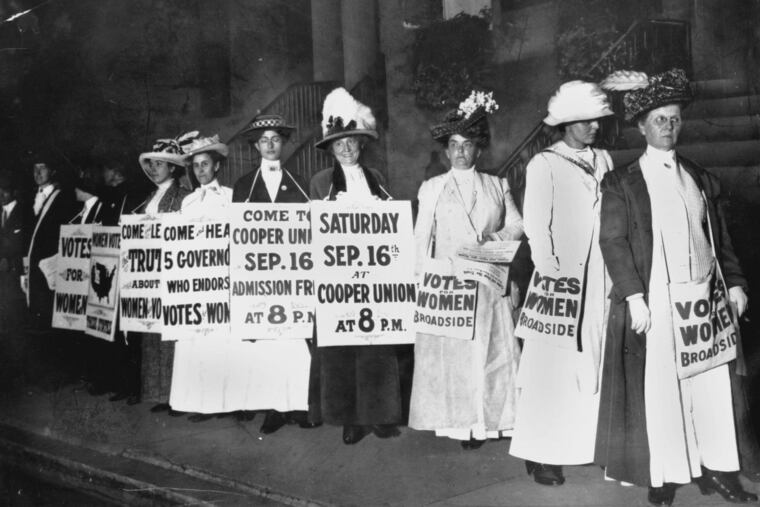100 years after 19th Amendment, voting rights and equality are still precarious | Editorial
Celebrate anniversary of women’s suffrage as a reminder of how far we still have to go.

It’s tempting to scoff at our forefathers for the quaintness of their notions, particularly notions regarding what women were and weren’t allowed to do a few centuries ago, like vote. The forefathers of The Inquirer editorial page are no exception. One hundred years ago, in the years leading up to passage of the 19th Amendment, the board had much to say about the idea of women being granted the right to vote.
In a number of editorials, the board expressed ongoing skepticism that women wanted or deserved the ballot. In 1915, The Inquirer opined: “The vote in New Jersey [against giving women the ballot] while cast by the men, in all probability is representative of the wishes of the majority of Women.” Two years later, the board excoriated suffragists for picketing President Woodrow Wilson as a “silly and senseless attempt to bring him about to their way of thinking,” going on to refer to these “ungentle sisters” and “shrieking sisterhood.” Today, such sentiments prompt eye-rolling, especially from the female editors currently in charge of these editorial pages (which are part of a news organization overseen by a female publisher).
But there’s a limit to the amount of ridicule – and celebration, for that matter — that’s justified, because 100 years later, the right to vote is still precarious and women are still far from achieving the equality that they have been fighting for over the last few centuries.
While the centennial of the passage of the 19th Amendment is duly celebrated this week, the celebration may be overshadowed not just by the pandemic but by the rightful acknowledgment of how whitewashed the original suffrage movement was, sidelining Black women who made major contributions to the larger movement – to say nothing of the fact that it was decades before Black Americans fully gained the right to vote. Fortunately, along with Ida B. Wells, the names of Sarah Parker Remond, Frances Ellen Watkins Harper, and Mary Church Terrell are taking their place beside such voting-rights icons as Elizabeth Cady Stanton and Susan B. Anthony.
» READ MORE: 10 lessons for 2020 from the bloody, messy fight to pass the 19th Amendment | Opinion
This acknowledgment is a necessary part of the larger reckoning on race prompted by recent Black Lives Matter protests.
Our most cherished narratives involve the democratic ideals on which this nation was founded. The fact is, that from the time America’s democracy saw the light of day there have been efforts to suppress full participation in that democracy. Early on, for example, the vote was granted to white landowners only. Later, restrictions both blatant and less blatant — like poll taxes, literacy tests, voter ID requirements, and gerrymandering -- have attempted to disenfranchise a wide swath of the population from participating in democracy. Some of these barriers have been eliminated; some remain firmly in place. And the Supreme Court continues to issue rulings that put voting access at risk. One of the most serious was its striking down of part of the Voting Rights Act in 2014′s Shelby County v. Holder decision. A corrective that would reauthorize and restore the Voting Rights Act is stalled in Congress.
Most recently, attempts to undermine the Postal Service threaten a new set of risks to people’s ability to vote.
The long telescope of history shows us how far we’ve come – but also reveals how far we still have to go. Kamala Harris’ acceptance of the vice presidential nomination as the first Black female to appear on a major-party ticket is a milestone, as was Hillary Clinton’s presidential campaign – but these milestones are also remarkable for how long it took to get here.
» READ MORE: On the momentum of Kamala Harris, U.S. women should continue to lead the vote | Opinion
The 19th Amendment held the promise of gender equality, but on that, we also have far to go.
On too many counts — earnings compared with men, rights to control their own bodies and reproductive futures, in representation in government and in corporate boardrooms -- women still lag, and new threats to equality continue to join old threats. The victory of the 19th Amendment should be celebrated, but its true importance is as a reminder that the fight for access and equality must continue. Hopefully, a hundred years from now, these inequalities too will seem a quaint chapter from the past.